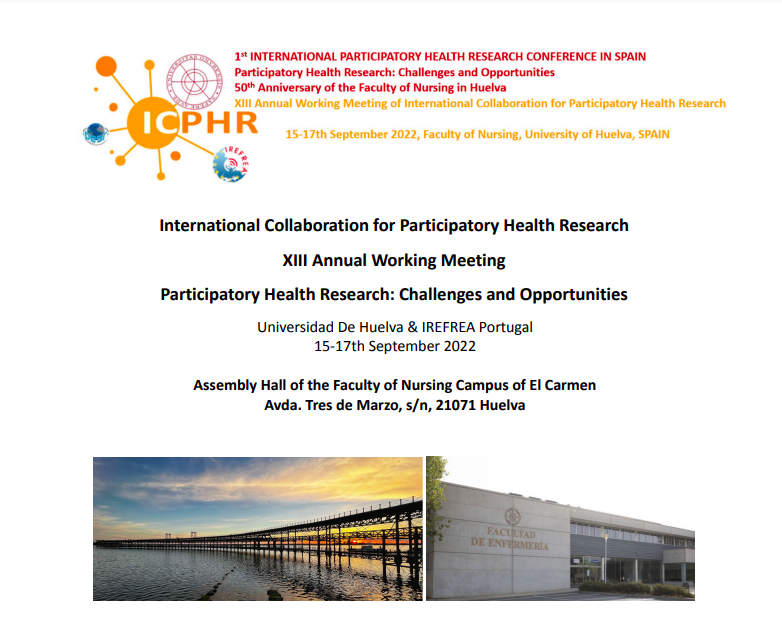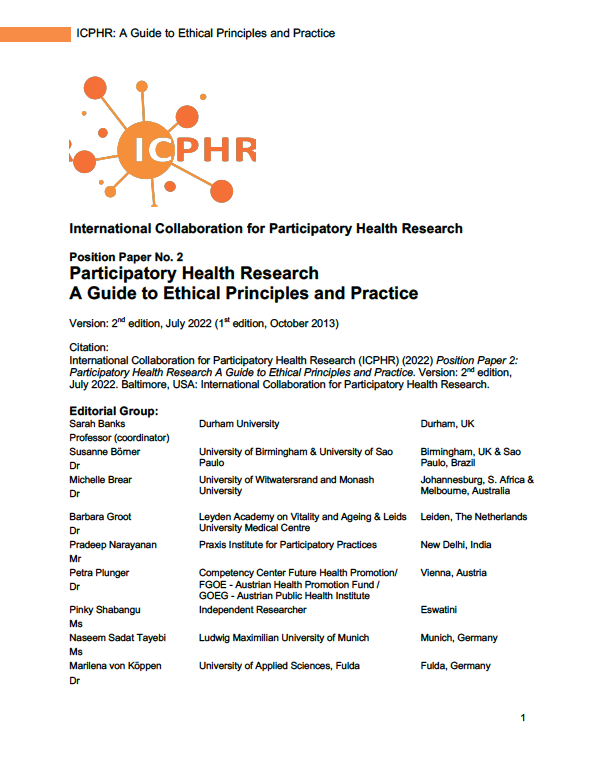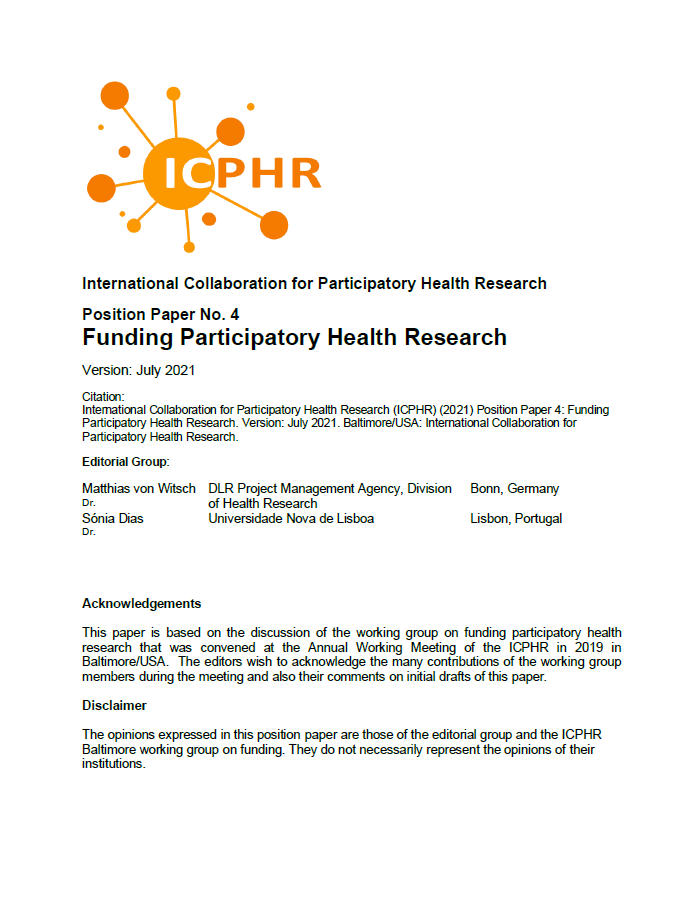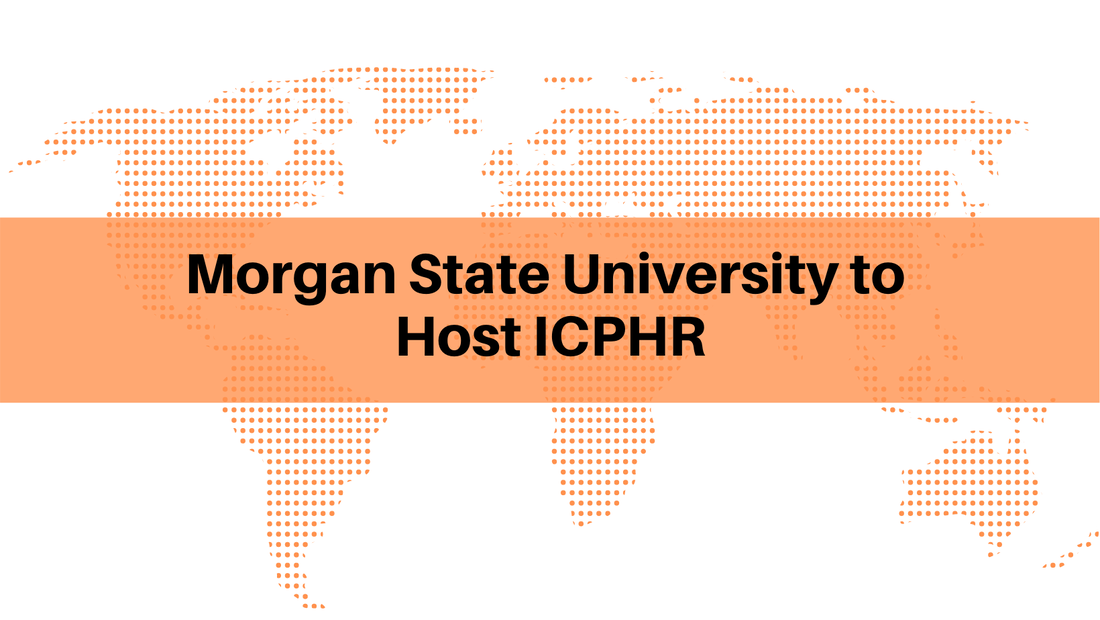|
The Ethics in Participatory Health Research Working Group, facilitated by ICPHR member Prof. Sarah Banks, has updated their working group description. To learn more about the working group and opportunities to get involved, visit the Focus Areas under Getting Involved.
ICPHR members Drs. María Roura and Kim Ozano are Guest Editors of a Special Issue of International Journal of Environmental Research and Public Health "Social and Structural Determinants of Health in Migrants and Ethnic Minorities—Conceptual, Methodological, and Empirical Advancement in the Times of COVID-19"
To learn more about the Special Issue, visit the link below. Deadline for manuscript submissions: 28 February 2023
Time zones:
7.30 p.m. – 9.30 p.m. India 2 p.m. to 4 p.m. GMT 9.00 a.m. – 11 a.m. Colombia, EST Canada and USA 6.00 a.m. – 8.00 a.m. BC, Canada It was in 1976 that a group of interested persons across North America first met to discuss Participatory Research (PR) as an alternative means of research and use of knowledge for social change. In 1980, the first international meeting on Participatory Research was held in Ljubljana (in former Yugoslavia), attended by early pioneers of this ‘movement’ (Budd Hall, John Gaventa, Ted Jackson, Helen Lewis, Orlando Fals Borda, Rajesh Tandon, to name a few). The discussions from this meeting, and of the practice and theorising of Participatory Research over the next decade, began to be circulated internationally and regionally in cyclostyled newsletters, articles in now-defunded journals, and documentation of conference proceedings. Knowledge produced by social movements, in civil society, political organisations and in academia was synthesized and presented in an array of forms – text, statistics, drama, poetry, video, learning games. Such locally created and owned knowledge, used as tools to build capacities of community and social organisations in the Global South, contributed to the steady spread and sustained development of the theory and practice of Participatory Research. The origins and history of the development of the field of Participatory Research has largely remained undocumented, though it is a significant part of the oral tradition of its ‘elders’ who spearheaded the movement. In a seminal event celebrating 40 years of PRIA, in partnership with the UNESCO Chair in Community Based Research, we bring you the knowledge and experience of the ‘elders’ of Participatory Research. A lesson in history, along with explorations of its contemporary manifestations, spotlights the relevance of community-based, participatory research in a post-pandemic world. The symposium will explore the following questions:
Juan Mario Diaz Arevalo, Department of Politics and International Relations, University of Sheffield, and Sumitra Srinivasan, PRIA, India Translators: Walter Vanegas and Delia Ballén. Service provided by Transmisiones Live, Colombia, with the support of the Strategic Research Support Fund, Department of Politics and IR, University of Sheffield. Position Paper 4: Participatory Health Research is now posted! Under 'Resources' visit the 'Position Paper & Discussion Papers' page.
Guest Editors: Dr. María Roura School of Public Health, University College Cork, Cork, Ireland [email protected] Dr. Kim Ozano International Public Health, Centre for Neglected Tropical Diseases (CNTD), Liverpool School of Tropical Medicine, Pembroke Pl, Liverpool L3 5QA, UK [email protected] Deadline for manuscript submissions: 31 March 2022 Message from the Guest Editors This Special Issue of the International Journal of Environmental Research and Public Health (IJERPH) focuses on the broader determinants of health in the context of a severely racialized pandemic. We welcome papers focused on the social and structural determinants of COVID-19 in migrants and ethnic minorities, with a particular emphasis on the racial, gender, political, and legislative determinants of health. We are particularly interested in papers that employ transdisciplinary, participatory, and co-production research approaches to meaningfully involve migrants and ethnic minorities in the response to COVID-19, in its broadest sense. This includes a wide range of topics including, but not limited to, occupational determinants of health, access and uptake of vaccines, participation of ethnic minorities in clinical trials, stigma and discrimination, the built environment, living conditions, health care entitlements, and any other broader determinant of health; as well as approaches and tools to meaningfully engage migrants and ethnic minorities in action-oriented research.
The Independent Social Research Foundation is offering flexible grants for small groups. To learn more about this opportunity please visit the granting page here.
The deadline for applications is October 8th, 2021, 5pm BST. Dear ICPHR Members,
ICPHR is looking for leaders who are willing and able to bring their time, talents, and resources to support its mission. If you are interested in joining the Steering Committee, please complete the form linked below and include a 1-page bio or resume. Both documents should be submitted electronically to [email protected] by June 18th 2021. Best Regards Ethics in participatory research under Covid-19
Request for case examples (by 31 July 2021) Susanne Börner, University of Birmingham, UK, [email protected] Petra Plunger, St. Pölten University of Applied Sciences, Austria, [email protected] Sarah Banks, Durham University, UK, [email protected] Invitation We are inviting people to write short case examples about ethical issues in conducting participatory research during Covid-19 restrictions. By ‘participatory research’ we mean research where people who might usually be regarded as subjects of research play a more active role in at least some aspects of the process (e.g. design, data collection, analysis, dissemination, implementation). We are seeking to include examples from different countries around the world, as well as from working across different groups in terms of age, gender, ethnicity, etc., relating to health and social well-being in the wider sense. The case studies can include (but are not limited to) issues such as: access to communities during Covid-19, trust-building online, issues of privacy and confidentiality in online communications, tackling digital exclusion, deciding whether to conduct research in-person, the impact of wearing masks and physical distancing, assessing new health risks, power dynamics, roles and responsibilities, etc. The case studies will be placed on the International Collaboration on Participatory Health Research (ICPHR) website. These can be used in training, teaching and in preparing groups to undertake participatory research projects. We may also use them in articles or other publications, with the consent of the case writers. The cases will complement the ICPHR ethical guidelines. Please download the following CALL FOR CHAPTER PROPOSALS: The Routledge International Handbook of Critical Participatory Inquiry in Transnational Research Contexts due August 30th, 2021
Health Promotion International has a special call for papers: Participatory health promotion research for sustainable change: Methodological and theoretical developments.
Submission of abstracts: 15 April 2021//Acceptance of abstracts: 30 April 2021// Online submission of full article for peer review: 1 August 2021// Publication: Early 2022 ICPHR members, Maria Roura, Sonia Dias, Joseph W. LeMaster, and Anne MacFarlane have published a new review article titled: Participatory health research with migrants: Opportunities, challenges, and way forwards in Health Expectations. Abstract
Context Migration is one of the most politically pressing issues of the 21st century but migrant health remains an under‐researched area. The International Collaboration for Participatory Health Research (ICPHR) working group on migration developed this position statement to address opportunities and challenges in relation to migrant health. It aims to contribute to a shift from a deficit model that sees migrants as passively affected by policies to their reconceptualization as citizens who are engaged in the co‐creation of solutions. Methods This paper examines the opportunities and challenges posed by the use of PHR with migrants. It draws on a broad literature to provide examples of successful PHR with migrants and highlights critical issues for consideration. Findings Successful initiatives illustrate the value of engaging migrants in the definition of the research agenda, the design and implementation of health interventions, the identification of health‐protective factors and the operationalization and validation of indicators to monitor progress. Within increasingly super diverse contexts, fragmented community landscapes that are not necessarily constructed along ethnicity traits, inadequate structures of representation, local tensions and operational barriers can hamper meaningful PHR with migrants. Conclusion For each research context, it is essential to gauge the ‘optimal’ level and type of participation that is more likely to leverage migrants’ empowerment. The development of Monitoring and Evaluation tools and methodological strategies to manage inter‐stakeholder discrepancies and knowledge translation gaps are steps in this direction. Patient or public contributionThis paper draws from contributions of migrant populations and other stakeholders to policymaking. February 2, 2021
Morgan State University (www.morgan.edu) announces that beginning in February 2021 it will be hosting the Central Office of the International Collaboration for Participatory Health Research. Morgan State University is located in Baltimore, Maryland (USA), and was established in 1867. Morgan State is one of the United States’ Historically Black Colleges and Universities (HBCUs), and is designated as Maryland’s Preeminent Public Urban Research University. Morgan is a research institution offering more than 126 academic programs leading to degrees from the baccalaureate to the doctorate. Morgan has a strong track record of international partnerships with China, Brazil, South Africa, Ghana, Botswana, Nigeria, and beyond. In June 2019, Morgan State University successfully hosted ICPHR’s 10th Annual Working Meeting, the first in the United States. The event was attended by more than 70 individuals from 12 countries around the world. Morgan serves a multiethnic and multiracial community of students, faculty, and partners outside the university, seeking to ensure that the doors of higher education are opened as wide as possible to as many as possible. In addition to maintaining the integrity of ICPHR, Morgan State plans to generate resources through U.S. federal and other grant opportunities so as to increase ICPHR’s organizational capacity. Prof. Payam Sheikhattari ([email protected]) and Ms. Gillian Silver ([email protected]), members of ICPHR’s Executive Committee, will lead the transition of the Central Office from Berlin to Baltimore. Contact either of them for more information. Newsletter of the International Collaboration for Participatory Health Research (ICPHR)
Fourth Quarter, 2020 Information en français: Nita Chaudhuri, [email protected] Informação em Português: Irma Brito, [email protected] Information auf Deutsch: Michael Wright, [email protected] In this Issue:
A new PHR German Review has been published:
Clar, C; Wright, MT (2020) Partizipative Forschung im deutschsprachigen Raum - eine Bestandsaufnahme. Thank you to the ICPHR membership who provided feedback on the draft ICPHR Terms of Reference (ToR). The new ToR are now posted on the ICPHR website under About--> Structure along with a list of current ICPHR Steering Group Members.
Newsletter, Third Quarter, 2020
In this issue:
|
Archives
November 2023
Categories
All
|
||||||||||||||








 RSS Feed
RSS Feed